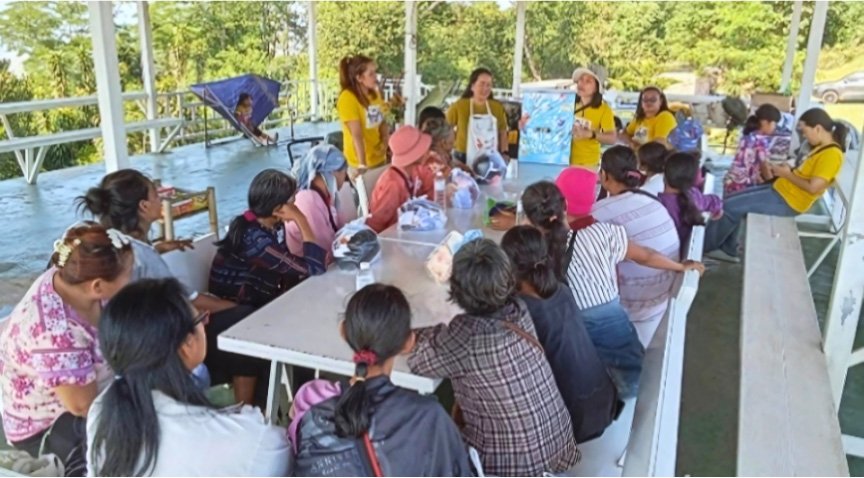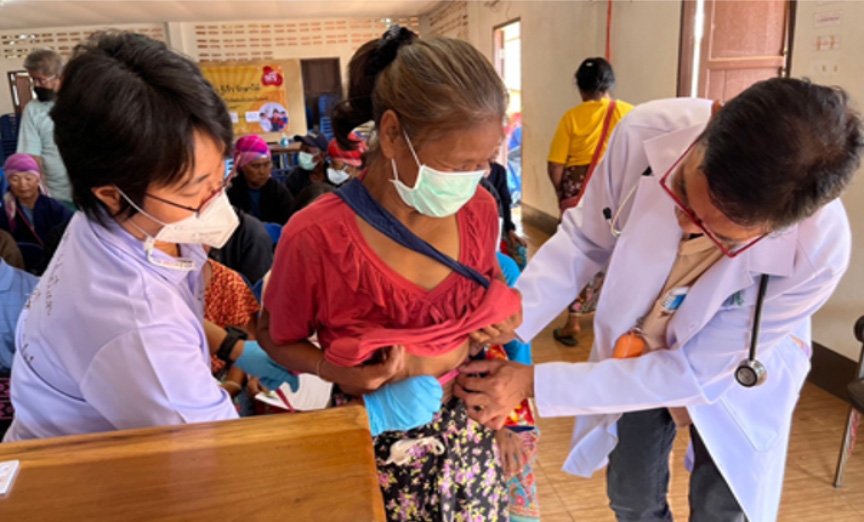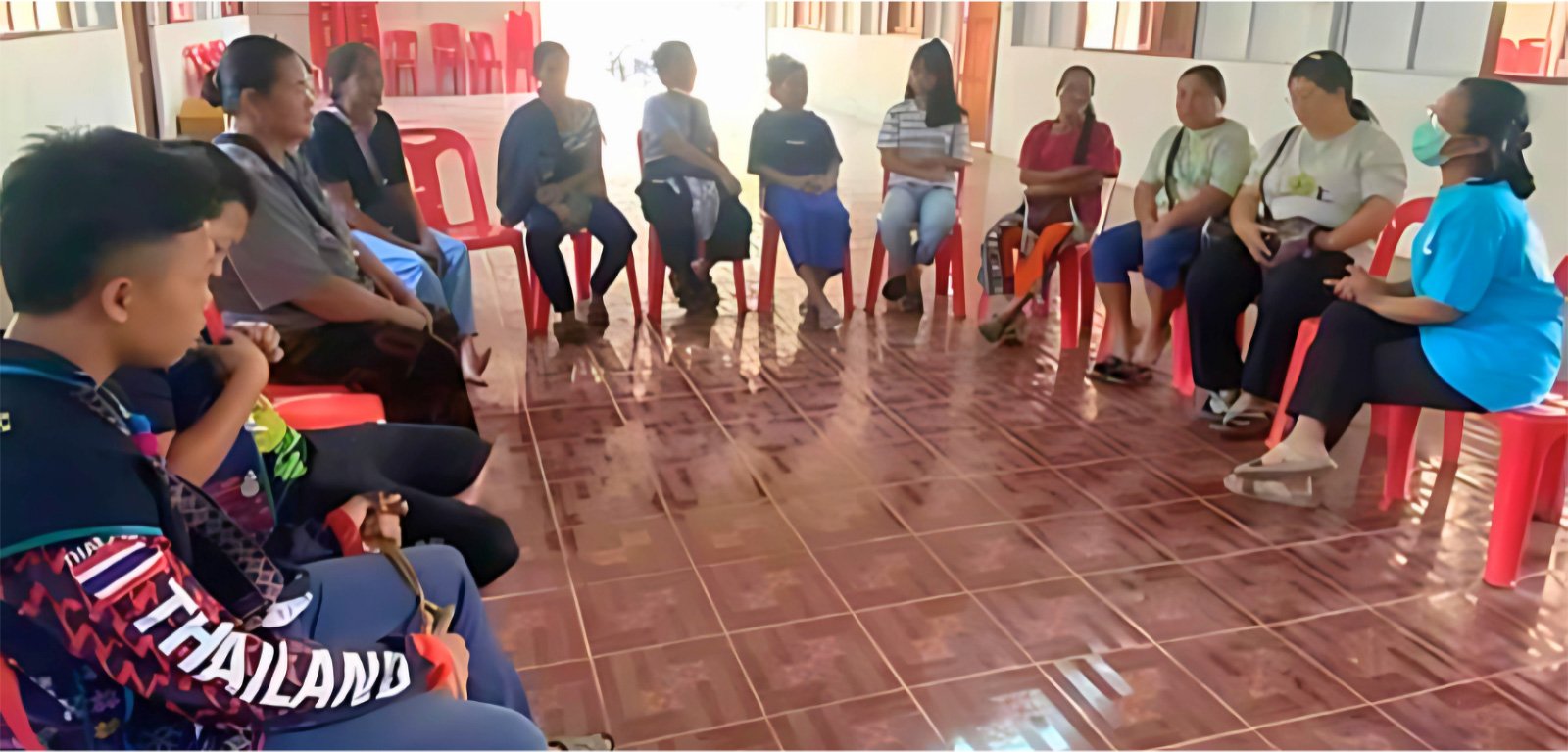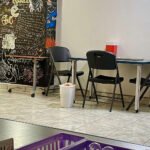The People for Change Foundation operates in Chiang Rai Province, a mountainous area home to a diverse population. Due to its geographical and social characteristics, Chiang Rai has a high prevalence of drug use. Drugs are a part of the lifestyle and culture of the community, used for work, pain relief, to reduce work fatigue and for relaxation.
It has been noted that PCF upholds principles of self-determination for service users. Can you give an example of how has been applied with women clients?

Initially, women who use drugs are often hesitant to participate in PCF activities. It requires ongoing fieldwork and honest dialogue to build trust until women are confident that there is a safe space for them to learn, share, and appreciate their own worth. The services are client-centered. The decision to participate in activities or referrals is their own right, without rushing or pressuring. Although it can be very challenging, it is worth it.
When women first participate in activities, they are impressed. They make new friends, share their joys and sorrows, learn and develop themselves. This process helps women realise their own worth. Convincing them to continue participating becomes no longer a difficult task.
Can you share some of the challenges in reaching women who use drugs in Chiang Rai Province?
Since January 2021, the Foundation has served 2,418 service recipients, of which only 12% are women. This reflects the difficulty of reaching women who use drugs, who often face more complex barriers than men. This is particularly true for ethnic minorities, who live far from service centers, cannot travel to receive services on their own, have difficult living conditions, lack education, cannot speak Thai, and/or are not Thai nationals. These barriers are significant barriers to accessing government rights and benefits.
Women who use drugs face the following challenges:
- Power relations within the family. Many begin using drugs with their husbands or partners, who control their access to drugs. Unequal relationships limit women’s choices.
- High risk of contracting sexually transmitted infections, sexual abuse, exploitation, and sexual violence.
- Limited access to reproductive health and contraception services, leading to unwanted pregnancies. Some are left raising children alone without a support system.
- Legal risks, such as being hired to open illegal bank accounts and becoming a suspect on behalf of men. They may not be able to afford bail or fall into debt, or have criminal records, which reduces access to government rights and benefits, as well as opportunities for self-development and job opportunities.
- Severe social stigma prevents many women from seeking services.
- The lack of a specialised service system that responds to gender and ethnic identity, such as a lack of interpreters and understanding female staff, can make women feel unsafe in seeking services.
How does People for Change Foundation (PCF) address the issues faced by women who use drugs?

PCF focuses on designing services that meet the specific needs of women who use drugs. It uses a “peer-to-peer” approach, with a team of experienced women field staff who possess deep understanding and communicate naturally and without pressure, allowing clients to think and make independent decisions. These staff act as listeners and counsellors, building trust through conversations about daily life and providing information on sexual health, reproductive health, childcare, and human rights. They also reduce barriers to accessing services, such as fear, stigma, or language barriers. Through simple, fun, and informal activities, women feel safe sharing their life experiences and practicing practical skills. This safe and welcoming environment helps women discover their true needs, which may be hidden under violence, poverty, or social pressure.
PCF’s services include:
- Health: Screening, primary care, referrals for treatment, and follow-up.
- Social and Psychological: Life skills, building networks and promoting self-care.
- Economy: Vocational skills, access to income sources, and financial planning.
- Family: Support safe and understanding family relationships.
PCF service connections serve as a “bridge” for women to access public and private services with dignity.
What elements/approaches/methods do you think are most important in making your services relevant and responsive to the needs of women who use drugs?
These service approaches are important:
- Focus on women’s needs by enabling them to participate in designing services that fit their own life context.
- Build trust through safe relationships, with consistent access and space for self-determination.
- Use a “peer-to-peer” approaches, with women who have experience of drug use as fieldworkers, helping to bridge the distance, foster natural conversations, and learn together.
- Provide holistic, integrated services that address harm reduction, physical and mental health, social, economic, family relationships, and rights.
- Respect the dignity and diversity of women, valuing all identities, including ethnic women, those with incarcerated histories, transgender women, and those without legal status. Clients are placed at the center as key stakeholders.
How does People for Change work to be inclusive of LGBTQ+ people who use drugs?
People for Change recognises that LGBTQ+ people who use drugs often face stigma and discrimination from their families, communities, and the health care system. Therefore, PCF has designed a flexible, open, and respectful working approach as follows:
- Strengthen staff capacity on SOGIESC (Sexual Orientation, Gender Identity, Gender Expression, and Sex Characteristics) to enable appropriate collaboration with LGBTQ+ people, including attitudes, language, such as using appropriate pronouns, respect for privacy, and avoiding stigma or oppression.
- Design activities that are relevant to the LGBTQ+ context, recognising specific drug use contexts, such as for sexual pleasure, in isolation, or where there is domestic violence. Expand safe spaces for self-disclosure, sharing experiences, and discussing relationships and sexual violence, respecting each person’s experience in a friendly, non-judgmental environment.
- Support peer-to-peer groups that embrace gender diversity, promoting understanding and respect for each person’s experience.
Do you have any other opinions or suggestions that you would like to share with others?
Respecting diversity is at the heart of service delivery. It must be non-judgmental, focused on deep listening, and creating safe spaces for all gender identities. Service providers must understand the gender, social, and cultural contexts of individuals, use appropriate language including local dialects, and create lasting change in communities, starting with empowering those experiencing problems to play a role in service design and provision. Promote attitude change in society, recognise the value and dignity of people who use drugs, and create service options that meet diverse needs.


